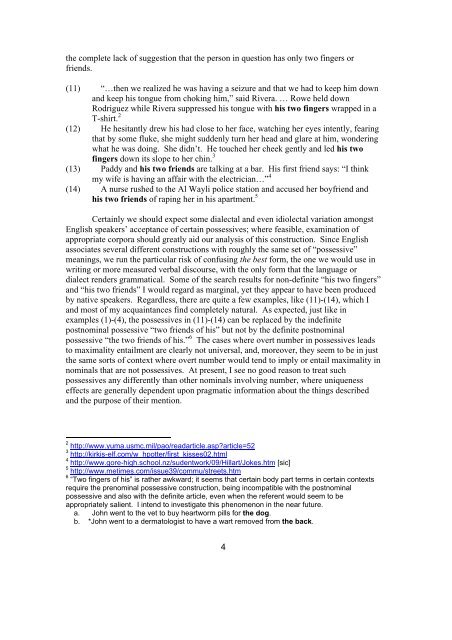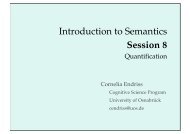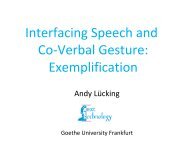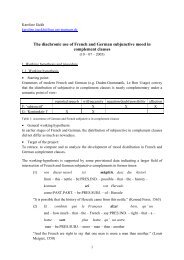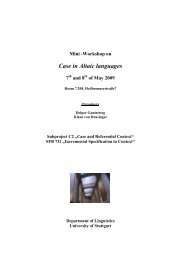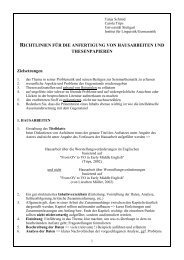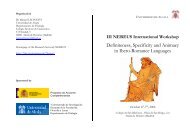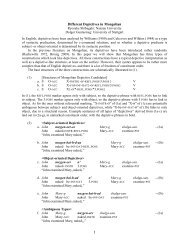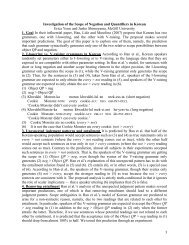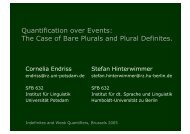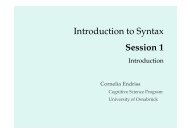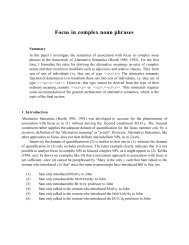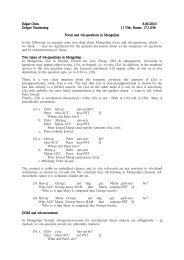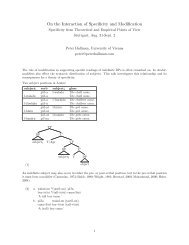SemPrag03.Progr.pdf - Institut für Linguistik/Germanistik - Universität ...
SemPrag03.Progr.pdf - Institut für Linguistik/Germanistik - Universität ...
SemPrag03.Progr.pdf - Institut für Linguistik/Germanistik - Universität ...
You also want an ePaper? Increase the reach of your titles
YUMPU automatically turns print PDFs into web optimized ePapers that Google loves.
the complete lack of suggestion that the person in question has only two fingers or<br />
friends.<br />
(11) “…then we realized he was having a seizure and that we had to keep him down<br />
and keep his tongue from choking him,” said Rivera. … Rowe held down<br />
Rodriguez while Rivera suppressed his tongue with his two fingers wrapped in a<br />
T-shirt. 2<br />
(12) He hesitantly drew his had close to her face, watching her eyes intently, fearing<br />
that by some fluke, she might suddenly turn her head and glare at him, wondering<br />
what he was doing. She didn’t. He touched her cheek gently and led his two<br />
fingers down its slope to her chin. 3<br />
(13) Paddy and his two friends are talking at a bar. His first friend says: “I think<br />
my wife is having an affair with the electrician…” 4<br />
(14) A nurse rushed to the Al Wayli police station and accused her boyfriend and<br />
his two friends of raping her in his apartment. 5<br />
Certainly we should expect some dialectal and even idiolectal variation amongst<br />
English speakers’ acceptance of certain possessives; where feasible, examination of<br />
appropriate corpora should greatly aid our analysis of this construction. Since English<br />
associates several different constructions with roughly the same set of “possessive”<br />
meanings, we run the particular risk of confusing the best form, the one we would use in<br />
writing or more measured verbal discourse, with the only form that the language or<br />
dialect renders grammatical. Some of the search results for non-definite “his two fingers”<br />
and “his two friends” I would regard as marginal, yet they appear to have been produced<br />
by native speakers. Regardless, there are quite a few examples, like (11)-(14), which I<br />
and most of my acquaintances find completely natural. As expected, just like in<br />
examples (1)-(4), the possessives in (11)-(14) can be replaced by the indefinite<br />
postnominal possessive “two friends of his” but not by the definite postnominal<br />
possessive “the two friends of his.” 6 The cases where overt number in possessives leads<br />
to maximality entailment are clearly not universal, and, moreover, they seem to be in just<br />
the same sorts of context where overt number would tend to imply or entail maximality in<br />
nominals that are not possessives. At present, I see no good reason to treat such<br />
possessives any differently than other nominals involving number, where uniqueness<br />
effects are generally dependent upon pragmatic information about the things described<br />
and the purpose of their mention.<br />
2 http://www.yuma.usmc.mil/pao/readarticle.asp?article=52<br />
3 http://kirkis-elf.com/w_hpotter/first_kisses02.html<br />
4 http://www.gore-high.school.nz/sudentwork/09/Hillart/Jokes.htm [sic]<br />
5 http://www.metimes.com/issue39/commu/streets.htm<br />
6 “Two fingers of his” is rather awkward; it seems that certain body part terms in certain contexts<br />
require the prenominal possessive construction, being incompatible with the postnominal<br />
possessive and also with the definite article, even when the referent would seem to be<br />
appropriately salient. I intend to investigate this phenomenon in the near future.<br />
a. John went to the vet to buy heartworm pills for the dog.<br />
b. *John went to a dermatologist to have a wart removed from the back.<br />
4


